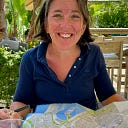The Re-emergence of Tennis in Iraq
In a country coming back from a brutal war, tennis is becoming competitive again
Adrian Brune, Jan 6 2022
Three “brothers” practice in Dohuk, Iraq in late November 2021. They were preparing for a tournament in Baghdad, which took place in early December.
All eyes during the “Australian Summer Season” are currently on Novak Djokovic and his visa/vaccine situation. And rightly so. In the Covid era, who is going to control the ego of the tennis player who defied all odds in the 1990s Bosnia war and came out as the top player in the world?
But what if we turned our gaze to a country currently rebuilding and on the cusp of greatness, if not necessarily for talent, but for raw grit?
Djokovic often refers to practicing his strokes in bombed out swimming pools and shelters commonplace at the time. He also references his sheer determination to succeed. While these Iraqi players have (a few) courts leftover front three wars in there different decades, they have practiced and played amid shelling, bullet fire, as well as an ISIS “fatwa” against athletes and the rebuilding of their native country. If nothing or no one else proves that tennis is no longer a “country club” sport for the wealthy, then count on the Iraqis to change your mind. Below is a photo essay of the courts encountered during a November 2021 trip to Northern Iraq (Kurdistan) and the players at the ready to make themselves and their country relevant once more.
The Dohuk Sports Club, in Iraq’s Kurdish region, just a few kilometers from the former ISIS stronghold of Mosul, is one of the few places in Northern Iraq where girls and boys from around the region flock to play tennis.
Driving past the Nineveh Plains, a sharp left on a Tuesday night in late November leads visitors over a bridge and then past the tennis courts where the floodlights still gleamed brightly at 10pm.
“Our parents enjoyed playing while we were living in Germany,” says Shihan Amedi, a bespectacled 16-year-old watching his friend from the sidelines. “And they taught me to play, and I played a lot over there. But they grew homesick and wanted to come back to Iraq. So I did.”
Tennis gradually spread from the elite Iraqis in Baghdad, pushed northward by the International Tennis Federation (ITF). The world governing body dispatched balls, racquets and then, as the security situation improved, tennis consultants to form Iraqi national teams for both the Davis and Federation Cups.
Today, a boy practices in calm in Peshmerga Park, Erbil, Iraq. But in May 2006, tragedy struck when extremists shot Davis Cup coach Hussein Rashid, 35, and promising players, Nasser Hatem, 28, and Wissam Adel Audal, 25, as they dropped off their laundry in Baghdad. It was later discovered that a fatwa against professional athletes had been declared).
Many international tennis coaches and consultants have recommended that aspiring Iraqi professionals move to another country, such as Dubai or Morocco, which has invested heavily in the “prestige” sport, in order to stand a chance on the world stage.
But hope springs eternal in the cradle of civilization. Iraq has several outstanding juniors coming up the ranks, including Kuwait’s Rafa Nadal Academy recruit Mohamad Rafa, 17-year-old Mohammed Abuzed Saber, and seasoned player, 28-year-old Adel Mustafa Al-Saedi — the latter two played on the Iraqi Davis Cup team in Turkmenistan last October. The team decisively defeated the richer, better equipped Oman team in the Asia/Oceania Group IV, but lost to neighboring Iran.
Amedi and his friends, who often play tournaments in Erbil’s Peshmerga Park still dream of putting Iraq’s flag up on the list of ITF, ATP or WTA rankings in the coming years.“Yes, there is very little motivation sometimes to keep tennis going — all the resources seem to go to football,” Amedi says. “But there is a core group of us who want to be standout players, who want to bring tennis back to Iraq stronger than ever.”
Two young women in Iraq: one one her wedding day in front of the single county in Central Erbil’s Shanadar Park; the other at Peshmerga Park, practicing her strokes.
